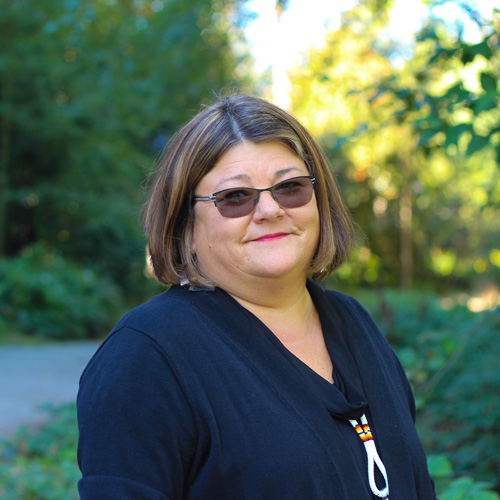Home Cooking, Traditional Foods & Your Health
A message from Dr. Shannon McDonald, FNHA Acting Chief Medical Officer

March is Nutrition Awareness Month – an ideal time for us to remind ourselves that good nutrition is essential and foundational to maintaining optimal health. Good nutrition, or "Eating Healthy," is one of the FNHA's four key wellness streams, along with "Being Active," "Nurturing Spirit," and "Respecting Tobacco. Setting goals in each of these areas can have positive impacts on our health. In this message, I'll share about the benefits of choosing to cook at home with real, whole, traditional foods – including vegetables, fish, berries, seafood, wild meats/game, roots, plants, fruits, beans, grains and seeds.
As an Indigenous physician who believes in promoting proactive health and wellness, I'm a true advocate for home cooking. It is not only a creative, life-affirming activity, but it can also be fun and even spiritual, and I believe it is essential to achieving overall health and happiness. In fact, making a daily habit of cooking and dining at home can change your life! This is because the act of cooking is not only beneficial to our physical health, our land, water and environment, but also to our mental health, our families, our communities and our sense of how our eating connects us to each other and the world.
What's more, cooking is an art, as well as an act of love, sharing and caring. And as with any skill, mastering it brings a sense of achievement and accomplishment. Where possible, include your children or partner in the cooking to reap these benefits and to spend valuable time together. In this way, the seemingly simple act of day-to-day home cooking can help us build or rebuild connections.
Cooking together as a family or community may be especially healthy for Indigenous people, for whom disconnection – from our families, communities, lands and traditions – has been and continues to be a major source of health and wellness problems. Preparing and cooking traditional food has been a source of connection, sustenance and healing for communities since time immemorial, not just from a physical perspective but also from an emotional, mental and spiritual perspective. Without access to traditional foods, many cultural and traditional practices, including medicinal practices, would be lost. In addition to their cultural significance, traditional foods are an important source of sustenance for Indigenous people as they provide a wide variety of nutrients that our bodies need to develop, heal and function properly including carbohydrates, protein, fat, fibre, as well as the very essential vitamins and minerals.
In today's faster-paced world, many people no longer cook or eat traditional / real / whole foods, opting instead for the faster, processed "foods" sold by the food industry – highly addictive, poor-quality, food-like products that fatten and sicken us. Instead of hunting, gathering or growing our own food, then skillfully preparing it as we did traditionally, too many of us are now consuming these products, which are packed with health-harming additives, sugar, salt and chemicals. I'm not saying we have to hunt, gather or grow our own food; we just need to reorganize our priorities and put home cooking for health and wellness near the top. We also need to have the confidence that we can make better choices and prepare quality traditional / real / whole foods ourselves.
Ask other members of your community – especially the Elders, who were around before processed food became the norm – for their recipes, look online for fast, nutritious recipes, and get cooking! Practice will make perfect, or at least it will help you make meals that are good enough to eat!
Although changing your habits requires an adjustment of priorities, choosing to eat better by cooking at home can make us healthier, happier and usually helps to save money, too.
I encourage you to take advantage of the myriad resources available nowadays on how to eat and cook healthy. Below are just a few resources with excellent, helpful information.
In Health & Wellness,
Dr. Shannon McDonald
FNHA Acting Chief Medical Officer
Eating & Cooking Healthy Resources:
Traditional Foods Fact Sheets
Indigenous Recipes from Dietitians of Canada
Health and Wellness Diary
Healthy Food Guidelines
Nutrition 101
Sugar in Foods and Drinks
Fat in Foods
Helpguide.org: Healthy Eating Tips Tips and resources for healthy eating
Get Local BC Resources and information on local foods, their importance, impact on the environment and availability in BC
Eat Local List of local farmers markets
Setting the Table for a Healthy Food Conversation Tips for care providers working within Aboriginal Communities
Setting The Table Voices of South Island elders & communities on sugary drinks and children
Healthlink BC: Healthy Eating Search for nutritional facts by conditions, demographics or keywords
Healthlink BC Factsheet Generator Make your own factsheets on Sodium or sugary drinks

